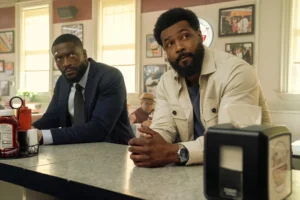Summary
Netflix film American Son highlights the social conundrum between Black America and the police, but the theatre-adaptation fails to keep its momentum.
Netflix film American Son is labeled as a ‘Television Event’, marking a new milestone for the streaming platform on the same month Disney+ and Apple TV+ lurk in the market ready for an inevitable war. It’s marked as an event because it’s based on the American play of the same name, bringing forth the same cast and director, maintaining the originality, the performances, and the story.
It follows Kendra Ellis-Connor, played by Kerry Washington, frantic with worry at the police station. Her young black son has been missing for a considerable amount of time, and her patience is waning as officer Larkin (Jeremy Jordan) returns sipping a takeaway coffee and doughnuts. His lack of urgency and care enhances Kendra’s worry, irritating her mothering nature to the core, knowing there is something deeply wrong with his disappearance. The story welcomes her estranged white husband Scott Connor (Steven Pasquale), as questions become more difficult, and the weight of waiting becomes painful.
American Son is a riveting, tense and emotional case study of the vicious cycle between Black Americans and police authorities. The story noticeably has one, well-scripted angle; the officer Larkin asks leading questions about her son, implying black stereotypes; he uses police techniques to paint a picture without exactly accusing anything. It reeks of inherited racism, and Kerry’s paranoia about the cop’s true intentions when seeking updates fuels a tragic conundrum that sadly faces America every day.
American Son ignites the conversation; a cultural problem that will not be solved in a couple of generations. Black Americans do not trust the police, and the police do not trust Black Americans, and the Netflix film initiates educated dialogue where the black mother is trying to find common ground with a white cop; neither of them wants to raise what the other is truly feeling about the case.
The television event is a cultural bubble glazed by leading sentences and flagrant body language, with plenty of telling social cues. It’s no coincidence that her detached husband is white, it’s part of the conversation, and not just a character. Each person on the screen serves a purpose in the social debate. American Son will already be analyzed and theorized about in many papers, purely based on the play that is replicated beat-for-beat by the Netflix film. For that, American Son deserves the accolades for being truly important as a subject matter — it signals who America is as a country and the varying perspectives of identity.
It’s useful to know that American Son is directed by Kenny Leon, the same director who brought us the revived Fences on Broadway, which was subsequently directed into a film by Denzel Washington. Despite its cultural implications, I was fond of Fences on the big screen. There is something uneasy about bringing theatrical attacking into a film environment.
I do not believe it works. American Son suffers from the same output. Like Fences, the first act works wonderfully, setting the stage, and bringing to life a well-scripted story. It then literally becomes a film that is surfacing Broadway performances. The experiment is worthwhile until you feel you should be watching this in a grand auditorium and not at home, perched on the sofa. The issue is born from the fact that Broadway shows do not have the chance to breathe — it’s scene after scene of character developments. Films need to breathe and not have a character outlandishly screaming out sentences for the purpose of the crowd in front of them — there is no crowd.
The criticism aimed at Netflix film American Son does not cripple its unique purpose, and it should not deter audiences from adding it to their watch list, but the question of whether moving from Broadway to cinema works remains an important debate. So far, it doesn’t




